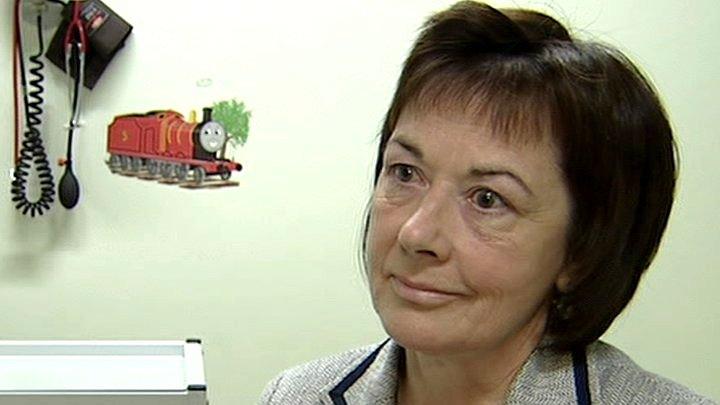Dr Heather Steen: From girl's death to dishonesty ruling
- Published
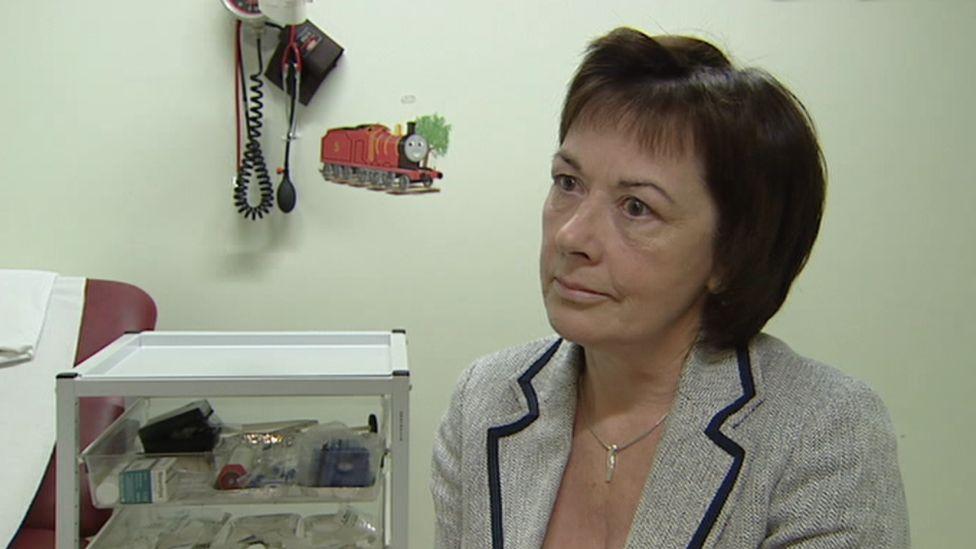
Dr Heather Steen previously applied to be voluntarily removed from the medical register
In 1996 nine-year-old Claire Roberts died, with her parents told her death was caused by a viral infection.
But years later Claire's death was examined by a major public inquiry and serious questions were asked of Dr Heather Steen - a consultant paediatrician involved in her care.
Among other allegations, Dr Steen was accused of a "cover-up".
After a General Medical Council (GMC) investigation, a fitness to practice hearing run by the Medical Practitioner Tribunal Service (MPTS) found the majority of allegations against Dr Steen had been proven.
The MPTS has handed down the most serious sanction - removal from the medical register.
BBC News NI examines the events leading up to the tribunal's findings.
23 October 1996: Death of Claire Roberts
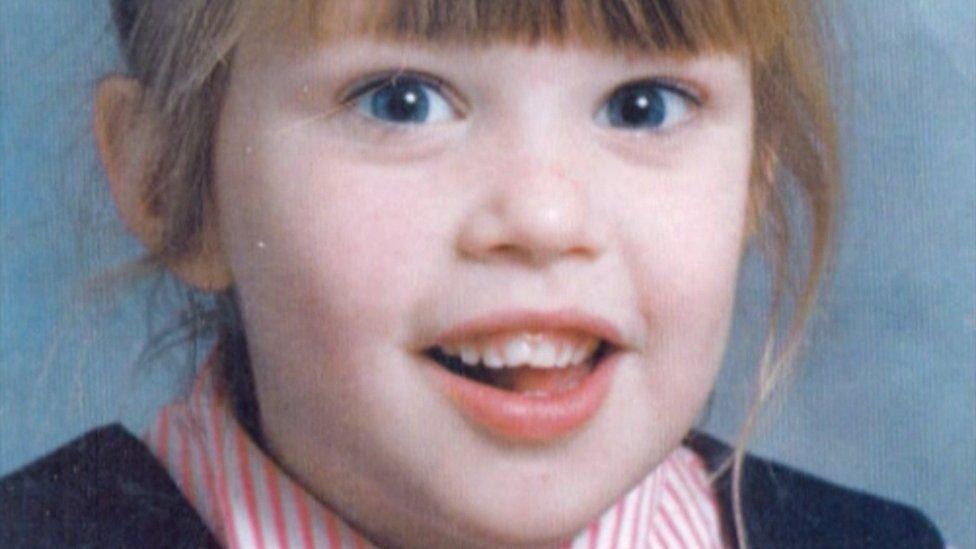
Nine-year old Claire Roberts died in Belfast's Royal Hospital for Sick Children in 1996
Nine-year-old Claire Roberts dies at the Royal Belfast Hospital for Sick Children (RBHSC).
The east Belfast schoolgirl has a history of epilepsy and moderate learning difficulties.
Two days before her death, Claire became ill with symptoms including vomiting and drowsiness - it was believed she was suffering from a stomach bug.
After seeing her GP, she was referred to the RBHSC's accident and emergency department on 21 October.
Hospital doctors prescribed intravenous fluids. However, Claire was given a fatal overdose of fluids and medication.
That night, blood tests showed a low level of sodium in her bloodstream suggesting that she had hyponatraemia.
Over the next few hours, Claire's sodium level continued to drop and on 23 October she suffered a sudden respiratory arrest.
A scan showed severe swelling of her brain. She died later that day.
Claire's parents, Alan and Jennifer Roberts, are told that their daughter died from a viral infection.
21 October 2004
A television documentary, Insight: When Hospitals Kill, about the deaths of three children in Northern Ireland hospitals is broadcast by UTV.
They died in separate incidents, but the programme alleges all three deaths - those of Lucy Crawford, Raychel Ferguson and Adam Strain - were a result of mistakes by staff as they administered intravenous fluids.
Dr Steen is not accused of any wrongdoing related to the deaths of Lucy, Raychel or Adam.
Claire's parents see the documentary and notice similarities with their daughter's case, leading them to contact the Children's Hospital.
As a result, Claire's death is reconsidered and referred to the coroner.
November 2004
Following the programme, an inquiry is launched into the deaths of Lucy, Raychel or Adam - it becomes known as the Hyponatraemia Inquiry.
The inquiry is the longest running public inquiry in the UK.
Hyponatraemia is a shortage of sodium in the blood that can be fatal.
At the first inquest into Claire's death in May 2006, two doctors tell the coroner that her case should be referred to the inquiry
By 2008, the inquiry is extended to examine the cases of Claire and Conor Mitchell, who died while receiving hospital care.
The Hyponatraemia Inquiry
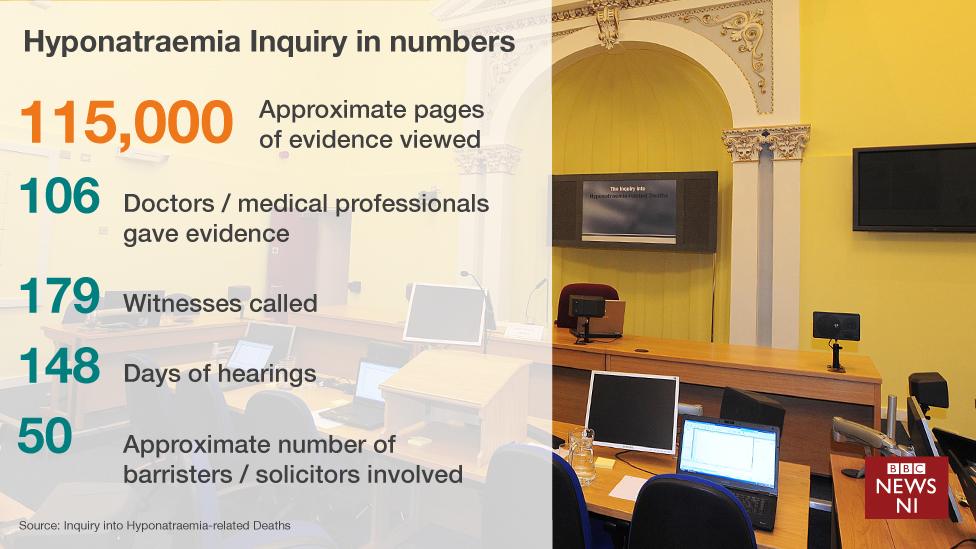
The inquiry hears that Claire was given 300% more medication than the quantity prescribed for her.
Dr Steen, a senior doctor on duty the morning after Claire was admitted to the RBHSC, tells the inquiry she cannot recall examining her.
The consultant paediatrician says she has "little memory" of events for health reasons and "can't defend my notes or those of others".
Claire's parents accuse some senior healthcare staff of a cover-up over their daughter's death in 1996.
The family's solicitor tells the inquiry that when an investigation into Claire's death finally got under way 10 years later, "it looked as though a hand was steering the evidence from behind the scenes".
Dr Steen denies claims of a cover-up over the death, but admits there were numerous deficiencies in Claire's care, including mistakes in the dosage of medication.
She tells the inquiry staffing levels were dangerously low at the time and that, in hindsight, Claire's death should have been reported to the coroner.
A former chief executive of Belfast Health Trust, William McKee, admits to the inquiry that his organisation failed Claire in her treatment and the communication with her family before and after her death.
The Belfast Trust ultimately publicly admits liability for Claire's death and a lawyer for the trust offers a "sincere apology for shortcomings in the management of Claire's treatment".
31 January 2018
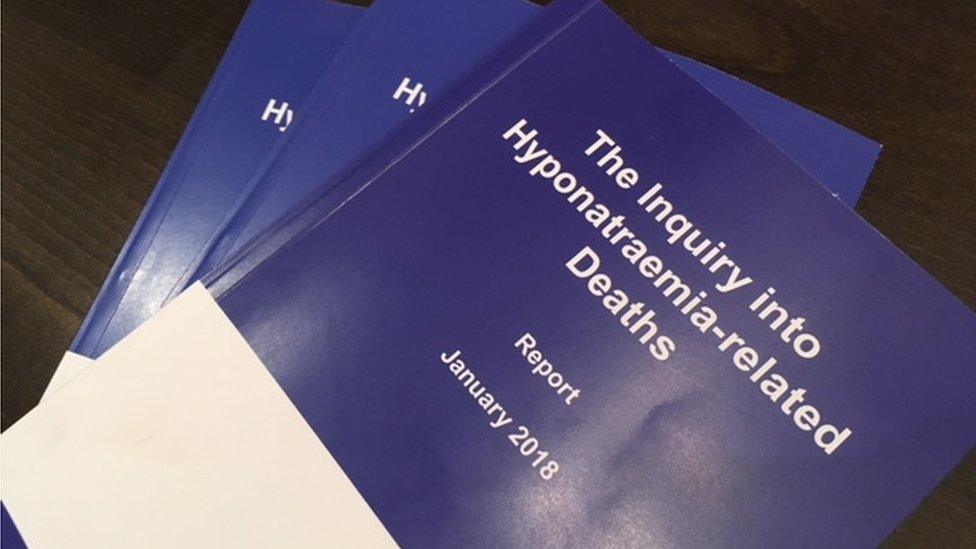
The Hyponatraemia Inquiry report made 96 recommendations
The inquiry finds the death of Claire - as well as three other children - was avoidable.
Chairman Mr Justice O'Hara is scathing of how the families were treated in the aftermath of the deaths and also the evidence given to the inquiry by medical professionals.
He finds there "was a cover up" in Claire's death, which was not referred to the coroner immediately "to avoid scrutiny".
9 April 2018
Northern Ireland's attorney general directs the coroner to open a fresh inquest into the death of Claire.
In a statement, her father says between 2004 and 2006 false and misleading information was supplied to the coroner.
"As a result (of that), the coronial system was undermined and we, as grieving parents, were failed and misled," he says.
Mr Roberts says it is now up to the coroner for a second time to examine why his daughter died.
21 June 2019
The inquest finds Claire's death was caused by the treatment that she received in hospital.
The coroner, Joe McCrisken, says he considers, on balance, that an "overdose" of fluids contributed to her death.
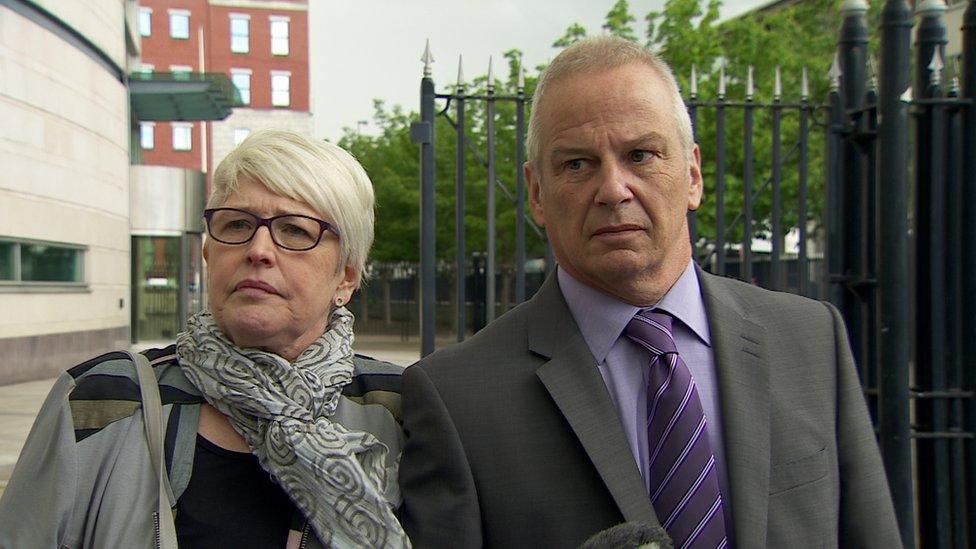
Jennifer and Alan Roberts testified at the inquest into their daughter's death
Speaking outside court, Claire's family thank the coroner for reaching his verdict.
Her father says it is "reaffirming what we have known for 15 years".
The Belfast Trust says it will "carefully consider the coroner's conclusions and recommendations".
March 2022
An MPTS fitness to practice tribunal begins, inquiring into allegations that between October 1996 and May 2006, Dr Steen knowingly and dishonestly carried out several actions to conceal the true circumstances of Claire's death.
The GMC refers a doctor to the MPTS if allegations against the doctor suggest such a serious failure of the doctor to meet its standards that, if proven, their fitness to practise would be impaired
Within minutes of the tribunal starting, Dr Steen's lawyers apply to the MPTS for her to be voluntarily removed from the medical register, which would end the tribunal within days, but the application is rejected.
At the tribunal, Dr Steen admits failing to tell Claire's parents that her death should have been reported to the coroner.
She denies allegations that she acted dishonestly and engaged in a cover up.
The tribunal later hears Dr Steen is "having difficulties following and absorbing" the discussion and goes into private session to check on her.
The GMC tells the tribunal there was evidence of "simple dishonesty" and that Dr Steen's conduct "fell below that which was expected".
A lawyer for the GMC says Claire's father was "continuously misled" and it has been a "struggle for answers".
Claire's father tells the hearing that following his daughter's death, Dr Steen told him and his wife there would be a "hospital-only post mortem and there would be no need for an inquest".
A lawyer acting for Dr Steen says his client has "no real recollection or clear recollection of this conversation".
He adds that it wouldn't be her "usual practice" to tell parents this.
General Medical Council lawyers argue Dr Steen's actions at the time were "dishonest" and to "avoid scrutiny".
September 2022
As proceedings reach the halfway stage, Dr Steen is expected to give evidence but instead her legal team submits a second bid for voluntary erasure.
This application is also rejected.
October 2022
GMC lawyer Tom Forster KC says that is "undoubtedly the position that Dr Steen has been a good doctor throughout her career" and references testimonial letters written about her
However, he adds he is "very unhappy to say that I'm afraid on this particular occasion the weight of the evidence is that Dr Steen abandoned her duties as a doctor".
The lawyer tells the inquiry "she abandoned them in 1996, motivated to cover up failings in care when it all happened on her watch and then controlled things thereafter".
In his closing submissions, a lawyer acting for Dr Steen, Kevin McCartney, says she has been "painted as an almost Machiavellian character who has sought to influence documents, sought to influence other doctors".
"There was reference to the closing of ranks of doctors and my submission is that really you should approach such general characterisation with some care, to look first of all to see whether the evidence actually supports the type of propositions that were being put forward this morning."
November 2022
The tribunal finds the majority of allegations against Dr Steen to have been proven.
In a majority of the allegations, the tribunal did not uphold the application of no case to answer.
Some allegations were not proved.
Examples of the allegations which were proved, included:
A failure to repeat a blood test on two occasions
Misrepresenting to Claire's parents that the autopsy report had identified a viral infection as the cause of death
Writing an inaccurate letter to Claire's GP
Failing to accurately disclose medical information in a statement in 2005 for the coroner's inquest
Signing a death certificate when she knew she had insufficient information available about Claire's cause of death
Failing to report Claire's death to the coroner when she knew it was sudden and unexpected
She is then found unfit to practise by the tribunal and is given the most serious of sanctions - being removed from the medical register.
Related topics
- Published11 November 2022
